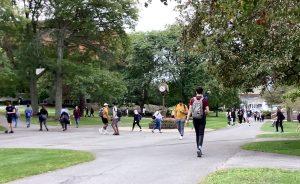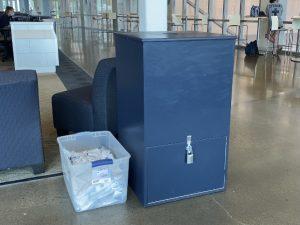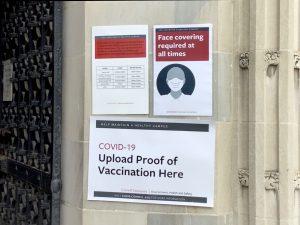
The city of Ithaca welcomed back students from Ithaca College and Cornell University in late August for the new academic year. As students, staff, and faculty try to adapt to the new normal, feelings of excitement and some concern linger throughout both institutions.
Adjusting back to Campus Life
Both Ithaca College and Cornell University campuses are livelier and more active compared to last semester, due to students being back for in-person classes. With the lack of an option for online classes, foot and vehicle traffic around campuses have increased, and common area spaces are populated.
“I was not very productive over the past year,” said Cornell University senior Faris Aziz. “Coming back to campus has allowed me to be more productive and to do more things I want to do.”
Residential halls are a lot fuller this semester compared to last. Students are eager to socialize but need to be mindful of the policies put in place. Sierra Winter-Kleppel, a residential assistant at Ithaca College, said there are challenges of managing her residents.
“The only COVID rule that is put in place is having to wear a mask in common spaces,” said Winter-Kleppel. “Often students don’t wear their masks when hanging out in the lounge…we’d ask them to put on their mask and often are cursed at or ignored.”
Student Involvement
Student Health Emergency Liaison (SHEL) is a role offered to students coordinated by The Office of Public Safety at Ithaca College. Public and Community Health Majors were recruited by their advisors for the position, offering an on-campus internship of helping with testing sites, managing quarantine rooms in Emerson Hall, and contact tracing for those who may have been exposed to the virus.
“It’s interesting, in some ways, being the face of the COVID response because people see me when they need to get tested,” said Ethan Prybyla, who is a liaison. “It’s a weird feeling.”
Another SHEL, Erin Shaw, expressed how valuable the role was to further her career and give back to campus.
“It gave me the opportunity to not only use my skills as a public health major, but also helped me help the student body,” said Shaw. “I was getting feedback from my classmates and friends, and I was able to bring that up and implement some of It.”
Student Concerns
In contrast to the previous semester where COVID testing was required two times a week, Ithaca College initially started their Fall semester with no mandatory testing. Testing kits were available around campus for students who wished to voluntarily test. After a few weeks of classes, IC announced that they’d begin random testing students. Still yet, there are concerns over the lack of weekly testing from all students.

“One thing I still wish we were doing is the necessary testing,” said Shaw. “The pandemic isn’t over, and just because we are vaccinated does not mean we cannot get COVID.”
Cornell University saw a surge in positive cases within the first few weeks after move-in, putting them at code yellow, which meant they were at a moderate risk level. As of Sept. 21st, there were currently 35 active student cases on campus.
Cornell senior Thomas Yu said that although he is mostly satisfied with Cornell’s COVID response, a bit more could be done to make students feel more at ease.
“I’d like to see more outdoor dining areas,” said Yu. “It’s the same as how it used to be, just a few tables outside most eateries.”

A Hopeful Semester
Although students are adjusting to the new changes this year and finding a sense of normalcy, many voiced their excitement to be back on campus and in-person.
“I am very excited to be back on campus,” said Shaw. “In a pandemic, it is very ‘touch-and-go’ at times, but for the most part I am confident with the response.”
Aziz acknowledged that although the adjustment from a virtual semester to being back in person was challenging, he is optimistic about this semester.
“It was easy to go from my bed to my desk and take Zoom classes from there,” said Aziz. “There are pros and cons to everything, but I think this semester I’m excited to be more involved on campus.”






